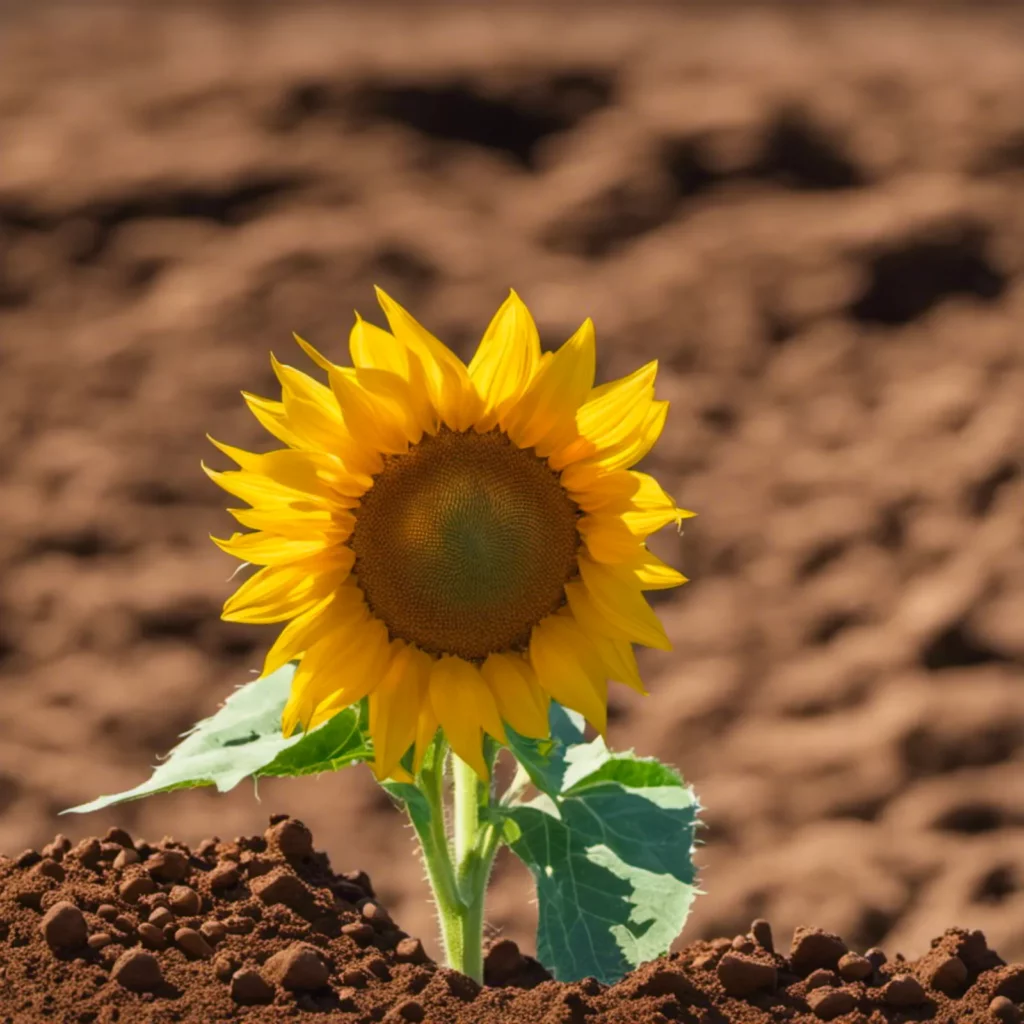Can Sunflowers Grow in Clay Soil? Tips for Growing Sunflowers in Heavy Soil
Have you ever wondered if sunflowers can thrive in clay soil? While clay soil can pose challenges for many plants due to its dense and heavy nature, it’s possible to achieve successful sunflower growth in these conditions.
In this article, we will explore the effects of clay soil on sunflower growth and discuss techniques to optimize soil conditions for sunflowers.
Key Takeaways
- Sunflowers can grow in clay soil, but it can present some challenges for sunflower growth.
- Clay soil is dense and heavy, making it difficult for roots to penetrate and absorb nutrients and water.
- With proper management, sunflowers can thrive in clay soil.

Can Sunflowers Grow in Clay Soil?
Can sunflowers thrive in clay soil? Yes, but it can be challenging. Clay soil is dense and heavy, hindering root growth and nutrient absorption.
To succeed with sunflowers in clay soil, improve drainage by adding organic matter like compost or well-rotted manure. Planting in raised beds or mounds and incorporating sand or grit can also help.
Avoid overwatering; deep watering once a week encourages root development. With patience and care, you can enjoy the beauty and nutrition of these stunning flowers in clay soil
Effects of Clay Soil on Sunflower Growth

Growing sunflowers in clay soil can be challenging, as the dense and heavy soil makes it difficult for the roots to penetrate and absorb nutrients and water. Here are some of the effects of clay soil on sunflower growth:
- Poor Drainage: Clay soil tends to hold onto water, which can lead to waterlogged soil. This can cause the sunflower roots to rot, which can stunt growth or even kill the plant.
- Compacted Soil: Clay soil can become compacted over time, which can make it difficult for roots to grow and absorb nutrients. This can lead to stunted growth and a weaker plant overall.
- Nutrient Deficiencies: Clay soil can be low in essential nutrients, such as nitrogen and phosphorus. This can lead to poor growth and weak stems, which can make the plant more susceptible to damage from pests and diseases.
Despite these challenges, it is possible to grow sunflowers in clay soil with proper management and care. Here are some tips for improving clay soil for sunflower growth:
- Add Organic Matter: Adding organic matter, such as compost or well-rotted manure, can help improve the structure of clay soil and increase its ability to hold onto nutrients and water.
- Amend Soil pH: Sunflowers prefer a slightly acidic soil pH of around 6.0 to 7.5. If your clay soil is too alkaline, you can amend it with sulfur or aluminum sulfate to lower the pH.
- Provide Adequate Drainage: To prevent waterlogging, make sure the planting area has adequate drainage. You can also add sand or perlite to the soil to improve drainage.
By following these tips and providing proper care, you can successfully grow sunflowers in clay soil.
Improving Clay Soil for Sunflower Growth
As avid gardeners, we know that sunflowers are a great addition to any garden. However, growing sunflowers in clay soil can be a bit tricky.
Clay soil is known for its ability to hold onto water, making it difficult for plants to grow. But don’t worry, with a few soil amendment techniques and choosing the right sunflower varieties, we can improve clay soil for sunflower growth.
Soil Amendment Techniques
To improve clay soil for sunflower growth, we need to amend the soil with organic matter to improve drainage and texture. Here are some soil amendment techniques to consider:
- Add Compost: Adding compost to clay soil can help loosen it up and improve drainage. Compost also adds nutrients to the soil, which can benefit sunflower growth. We recommend adding 2-3 inches of compost to the top of the soil and mixing it in well.
- Use Gypsum: Gypsum is a naturally occurring mineral that can help break up clay soil and improve drainage. It also helps to improve soil structure, making it easier for roots to penetrate. We recommend applying gypsum at a rate of 40-60 pounds per 1,000 square feet of soil.
- Mulch: Mulching around sunflowers can help to retain moisture and regulate soil temperature. This can be especially helpful in clay soil, which tends to dry out quickly. We recommend using a 2-3 inch layer of organic mulch around sunflowers.
Choosing the Right Sunflower Varieties
Choosing the right sunflower varieties for clay soil is important to ensure the plants can grow and thrive. While sunflowers are generally hardy and adaptable, some varieties may perform better than others in clay soil. Here are some tips for selecting the best sunflower species for clay soil:
- Choose Dwarf Varieties: Dwarf sunflowers are a great choice for clay soil because they have shorter roots and don’t require as much water as taller varieties. Dwarf sunflowers also tend to be more compact, which can make them less likely to topple over in heavy clay soil.
- Look for Drought-Tolerant Varieties: Drought-tolerant sunflowers are a great choice for clay soil because they can withstand periods of dryness. Look for varieties such as ‘Moulin Rouge’ or ‘Italian White’ that have been bred for drought tolerance.
- Consider Helianthus debilis: Helianthus debilis, also known as the beach sunflower, is a great choice for clay soil because it is adapted to growing in sandy soils. This sunflower species has a shallow root system and can tolerate drought, making it a great choice for clay soil.
By amending the soil with organic matter and choosing the right sunflower varieties, we can improve clay soil for sunflower growth. With a little bit of effort, we can enjoy the beauty and nutritional value of sunflowers in our gardens for years to come.
Protecting Sunflowers in Clay Soil
As we mentioned earlier, sunflowers can grow in clay soil, but it requires some care and attention. In this section, we will discuss how to protect sunflowers in clay soil by managing water and controlling pests and diseases.
Water Management
Clay soil can be challenging for sunflowers because it doesn’t drain well and can become compacted, making it difficult for roots to penetrate. To help sunflowers thrive in clay soil, we recommend the following water management tips:
- Water deeply and infrequently: Instead of watering frequently, water deeply once a week to encourage the roots to grow deeper into the soil. This will also help prevent the soil from becoming waterlogged.
- Mulch: Mulching around sunflowers can help retain moisture in the soil and prevent it from drying out too quickly.
- Add organic matter: Adding organic matter like compost or aged manure to clay soil can improve its structure and drainage, making it easier for water to penetrate.
Pest and Disease Control
Sunflowers can be susceptible to pests and diseases, especially when grown in clay soil. Here are some tips for controlling pests and diseases:
- Monitor regularly: Regularly check sunflowers for signs of pests and diseases, such as yellowing leaves or wilting. Catching problems early can prevent them from spreading.
- Use natural remedies: Instead of using harsh chemicals, try using natural remedies like neem oil or insecticidal soap to control pests.
- Rotate crops: Planting sunflowers in the same spot year after year can increase the risk of pests and diseases. Rotating crops can help prevent this.
By following these tips, you can help protect your sunflowers and ensure they thrive in clay soil. Remember to monitor your sunflowers regularly and adjust your care as needed.
Preparing Clay Soil for Sunflower Planting

Even the most intriguing stories need a well-set stage, and for our sunflower protagonists, the stage is the soil.
Here’s a guide to preparing your clay soil:
- Test Soil Composition: Before we can deal with clay soil, we must identify it. DIY soil tests can provide a good starting point, or you can take the Sherlock Holmes route and send a soil sample to a lab for precise results.
- Improve Soil Structure: Clay soil can be improved by adding organic matter like compost, leaf mold, or well-rotted manure. These additions help create spaces in the soil for water and air to move freely, making it more plant-friendly.
- Add Soil Amendments: Gypsum and coarse sand are effective soil amendments for clay soil. They help improve its structure and permeability, creating a welcoming environment for sunflower roots.
- Plant Sunflowers: After preparing the soil, it’s time for the sunflower seeds or seedlings to take the stage. Sunflowers aren’t picky about their depth, but generally, seeds should be planted about 1-2 inches deep. Water well after planting and ensure that the soil remains moist until the sunflowers have fully sprouted.
Ongoing Care for Sunflowers in Clay Soil
While the clay soil saga seems complex, the ongoing care for sunflowers is a light-hearted tale.
- Watering: In clay soil, overwatering is a bigger problem than underwatering due to its poor drainage. Water your sunflowers thoroughly but infrequently, ensuring the top inch of soil has dried out before watering again.
- Fertilizing: An application of a balanced fertilizer can provide the nutrients that might be lacking in clay soil. The best time to do this is when the sunflowers begin to bloom.
- Pest and Disease Management: Like any good story, there can be antagonists. In this case, pests and diseases. But worry not, with regular checks, use of organic pesticides, and rotating your sunflower crops each year, you can keep your sunflowers healthy and vibrant.
What Plants Grow Best in Clay Soil?
If you’re finding that sunflowers aren’t thriving in your clay-heavy soil, don’t worry – there are plenty of other plants that are better suited for these conditions. Some plants that grow well in clay soil include:
- Daylilies
- Hostas
- Coneflowers
- Coral Bells
- Sedums
- Asters
- Roses
- Black-eyed Susans
Frequently Asked Questions (FAQs)
Can sunflowers grow in clay soil at all?
While not ideal, sunflowers can grow in clay soil if you take steps to improve the soil conditions, such as constructing hips of loam sandy dirt.
How can I improve clay soil for sunflowers?
Amend the soil with organic matter, such as compost, and ensure proper drainage to create a more hospitable environment for sunflowers.
What are some signs that my soil is clay-heavy?
Clay-heavy soil is characterized by a fine texture, high water retention, and a tendency to harden and compact when exposed to sunlight.
How often should I water sunflowers in clay soil?
Keep the soil moist but not waterlogged. The frequency will depend on the weather and the specific conditions of your garden.
Are there any sunflower varieties that are more adaptable to clay soil?
While most sunflowers prefer well-drained soil, some varieties may be more tolerant of clay soil conditions. Research different sunflower varieties and consult with local gardening experts for recommendations.
Conclusion
Growing sunflowers in clay soil can be challenging, but it’s not impossible. By understanding the properties of clay soil and taking steps to improve its condition, you can give sunflowers a fighting chance.
However, if you find that sunflowers aren’t thriving in your clay-heavy garden, consider planting other plants that are better suited for clay soil conditions. With patience, persistence, and a little bit of experimentation, you can create a beautiful, thriving garden in clay soil.
Related Posts:






